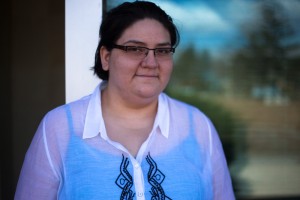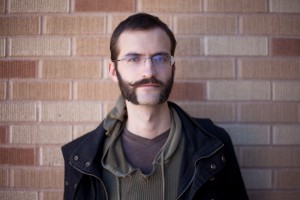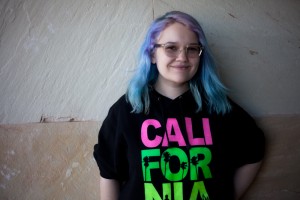Tags
Related Posts
Share This
Senior Readings

Blanca Olivas, performing with Charlotte Martinez, Nicole Souverbielle and Chantel Mitchell, April 22.
Photo by Amanda Tyler.
SFUAD’s Creative Writing seniors will be showcasing their work beginning next week. A class of 10 students have spent this semester revamping and workshopping each other’s bodies of work. From these revisions and discussions, senior books have accumulated, which will be published in the next few weeks.
During their readings, the seniors have a chance to perform 20 minutes of their work, either from their senior books, or elsewhere in their repertoires. With every showcase free, open to the public, and beginning at 7pm, Benji Vanatta, Tess Cutler, and Juro Gagne will kick us off on April 15. Charlotte Martinez, Nicole Souverbielle, Chantel Mitchell, and Blanca Olivas will follow on April 22. Morgan Dawson, Katie Johnson, and I will be reading May 6.
Jackalope Magazine: How are you feeling about the senior reading?
Blanca Olivas: I’m excited but I’m definitely nervous in that I don’t like to read in front of people, particularly with my family coming.
Juro Gagne: More excited than nervous. I’m just looking forward to having fun.
Katie Johnson: I’m so excited! I’ve been waiting for this performance since I came here. I’ve been anticipating this.
JM: Can you describe the group of people with whom you’ll be reading? How do you compliment/differ tonally from one another?
BO: There are four people in my reading, 20 minutes each. I think every one of us has different tones. Chantel’s pieces are different than [for instance] Nicole’s, who I don’t want to say is more subtle, but she has a softer tone to her reading.
JG: I think that when it comes to our subjects, we’re very different, but I feel like when it comes to our energy level, we’re all pretty much the same. For our reading, the theme that we’ve decided on is “Strange Landscapes,” because we’re all exploring and talking about very faraway places. With Benji, it’s more about fantasy, with Tess, it’s more about family history, and with me, it’s all about my travels. Our tone as a group is subdued, but very literary, very voice-based. We’re very “searching,” as a group.
KJ: I think we blend just enough, but we also have differences that vary up the night enough to make it interesting. It’s definitely not all tragedy, although there might be a good deal of that in all of our work, there’s also a good deal of lightheartedness, and just weird things for all of us, I think. It’s hard to describe us tonally. A commonality between us? Traumatic relationships? Performance, theatrics? I feel like we employ theatrics even in our writing, not just the speaking [aspect]. I think no matter what we do, it’s going to be theatrical. I think the whole event will be really impressive, and the night in itself is going to be theatrical.
Is it going to be a new experience for the audience hearing your text aloud, rather than reading your work on the page?
BO: For one, there’s going to be several edits, I took out sentences, things that just looked nice on the page but sounded weird when I read them aloud. And I think a lot of the pieces feel a lot more personal when I read them. I intentionally wrote them distanced, but when I read them, it’s like ‘Ohh, that’s how Blanca actually feels about it!’ I think that’s what’s definitely making me nervous. I’m so excited just even hearing the piece Chantel read aloud today, because it sounded so different than the way I’d seen it [in my reading,] and [the piece has] different iterations. So I’m excited to hear everyone’s work because I feel like it’s going to be a diverse experience.
JG: Definitely. Things always change. When it’s existing on the page, it really depends on the reader to put their own spin on it, I guess. And then it’s whether the reader has had a good day or something like that, but when the author is presenting the work, I feel like we have a better control over the tone that we want to present.
KJ: Yes, always, yeah.
Do you feel that the school prepared you for this reading?
BO: I had a lot of opportunities here [for public readings], but I didn’t take them. This will be my first time reading here, which is daunting, I should’ve taken those opportunities but I was like ‘ehh.’ I never had anything that I was really satisfied with [to read]. Now, I definitely am satisfied.
JG: [Yes], but not so much recently; I did a lot more readings when I was first getting here and I was more nervous about it, now I’m not so nervous. Definitely, [I’m feeling more confident,] it’s something I felt I always had an OK sense with, but it’s always a little bit nerve-wracking when you’re going to be getting in front of a crowd.
KJ: I think as far as performance goes, those were skills I developed before I came here, but as far as writing goes, yes, I have a lot more confidence in my writing than I used to, and I feel like it’s improved a whole lot since I came here.
Does this reading, and the work featured, feel like an accumulation of your time here?
BO: It initially felt like I was learning nothing [when I got to the school] but if I look at anything that I wrote previously, then there’s definitely been leaps and bounds of improvement. Stuff that I don’t even want to look at now. [laughs] Like, ‘let’s pretend this never happened.’ It was hard to look at them, [and one or two have made it into my book], and those were the fiction pieces, so I had to take a look at them and rework them.
JG: I have poems that I wrote last semester, and I have poems that I wrote my very first semester here, some of my first assignments. It was really weird revisiting them, but more-so working on the senior reading and my senior book. When you start putting the books together, you really start seeing into your own mind. You can just cover so much tonal range during a reading that you almost want to give someone a snapshot of what the inside of your head looks like.
KJ: There is going to be one older piece [at the reading] that I wrote when I first got here. But besides that, it’s going to be pieces I’ve been pretty much working on continually over the past couple years. I basically just chose my favorite pieces [from my book,] and the pieces that I thought would be best performed. Making this book has made me understand my self better, psychologically. Seeing what makes the collective that is my thoughts…that was intense.
JM: Could you describe that collective, Katie?
KJ: [laughs] Dude, no.








 Jackalope Magazine is the student magazine of Santa Fe University of Art and Design. Building on the interdisciplinary nature of our education, we aim to showcase the talent of our university and character of our city.
Jackalope Magazine is the student magazine of Santa Fe University of Art and Design. Building on the interdisciplinary nature of our education, we aim to showcase the talent of our university and character of our city.
Recent Comments